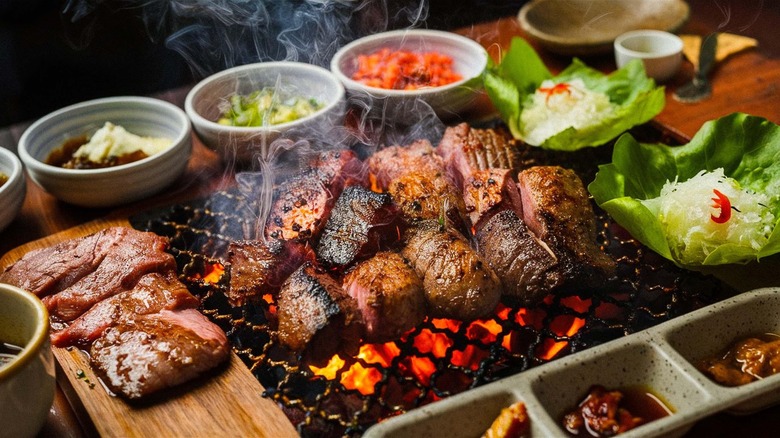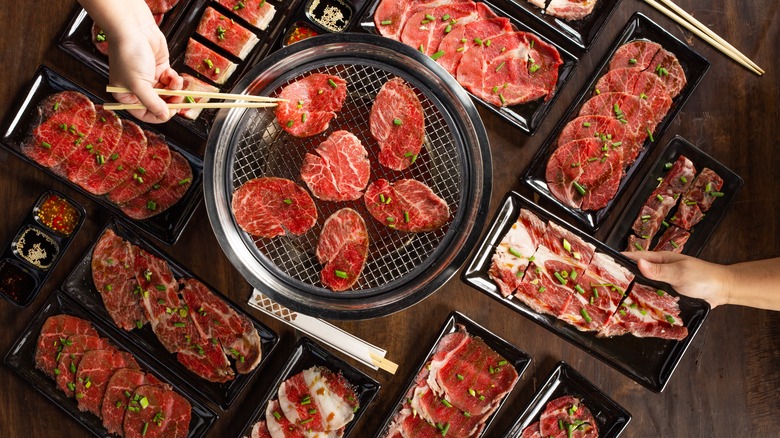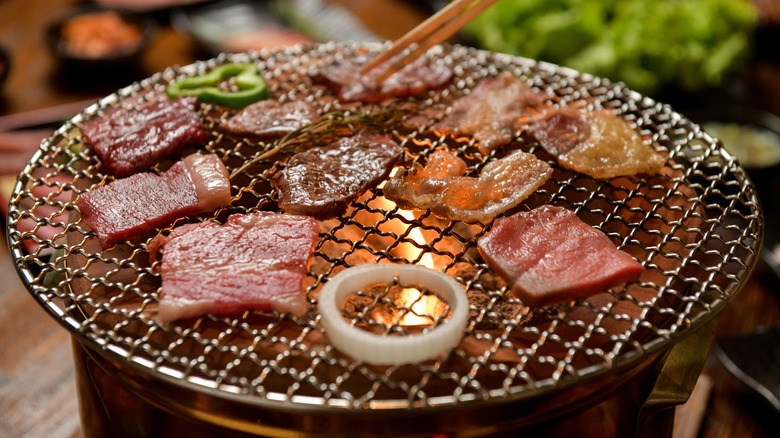The 2 Biggest Mistakes You're Making With Korean BBQ, According To A Chef
Hosting a Korean barbecue at home takes a lot of prep work, from slicing the meats and chopping the veggies to whipping up dipping sauces and setting up the tabletop grill. All the extra effort is worth it when your guests can create a customized meal at the table from the freshest ingredients while they sip on a traditional glass of soju. Plus, doing all the work in advance leaves you free to sit back and socialize without worrying about your appetizers and mains burning in the oven; everything is already set on the table in bowls and plates ready for transforming into a personalized bite.
Having said that, it can be disappointing when you've invited all your friends over for a culinary extravaganza but the flavor and texture of your grilled meats doesn't quite hit the mark. Luckily, we've got you covered! After speaking to expert Ji Hye Kim, Chef and Owner of Miss Kim in Ann Arbor, MI, we learned that you're likely using too much marinade and cooking the meat on an excessively high heat. Both of these mistakes cause the sauce that's coating the meat to burn, ruining all your hard work and smoking up your dining room.
Excess marinade overpowers the flavor of Korean BBQ
"There are two common mistakes people make when making Korean barbecue at home," Ji Hye Kim tells us. "[One mistake is] using too much marinade or too long of a marinating time to a point that all you're tasting is sauce and not the meat. Because most meat for Korean barbecue is on the thinner side (half an inch or less thick), you don't need hours of marinating or very strong marinade. For a pound of meat, you'd need about one to one and a half cups of marinade, and I wouldn't marinate them longer than an hour at most."
The common cuts of meat featured in Korean barbecue, like skirt steak, are cut into slender pieces so they cook through rapidly. Even short ribs, known as kalbi, are cleverly butterflied so each piece is transformed into a thin strip that cooks quickly, and ribeye is sliced super-thinly to make bulgogi. Preparing the meats in this way is vital because Korean barbecue is designed to be an interactive experience where each diner grills their protein of choice and immediately devours their bitesize morsel once its ready, either pairing it with some grilled veggies or dipping it in a sauce. While marinating the protein helps to tenderize the meat by breaking down its connective tissue, you run the risk of it turning mushy and losing its satisfying mouthfeel if you steep it for too long.
The sweet ingredients in Korean BBQ marinades are quick to burn
"People often start the meat on high heat whether you're doing it on a grill or over the stove," Ji Hye Kim adds. "That ends up burning the sauces/marinades on the outside of the meat before the meat is properly cooked. Korean barbecue marinades often have sweet ingredients like sugar, honey, fruit juices, or puree. The base of Korean barbeque marinades almost always include one or more of Korean mother sauces like gochujang, doenjang, and soy sauces and these sauces can burn faster than you'd think. So, you want to cook/grill Korean barbecue meat on medium to medium high heat, but never at the highest temperature."
Gochujang and doenjang burn quickly because they contain either a Japanese sweetener called mizuame (which is also know as starch syrup) or a classic corn syrup. Exposing the added sugars (or natural sugars in the case of soy) in your marinade to fiercely high heat causes them to caramelize. When done at the correct rate, this process intensifies the savoriness of the meat, boosting its inherent umami quality and lending it that appetizing grilled flavor. However, if the sugars begin to burn before the meat has cooked through, they create a bitter taste on the surface, rendering your cuts unpalatable. For this reason, it's always better to go for a lighter coating of marinade on a thinner cut of meat.


